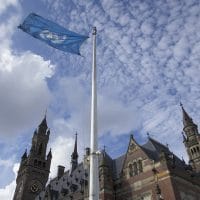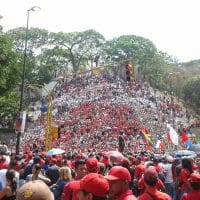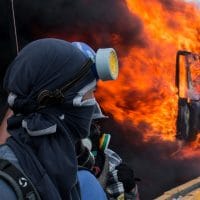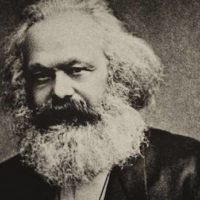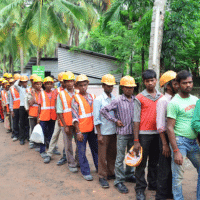-
Killing the most beautiful things we own
The fight over the Amazon is not new, but the scale of its potential destruction has considerably increased. The protagonists of the murder of the Amazon are clear: capitalist firms of different scales and the political class that enables them.
-
New attack on electricity system seeks to halt Chavista counteroffensive
This time the attack was physical: an operation against the bank of high voltage transformers that convert electricity to be transmitted.
-
Venezuela: New widespread power outage as gov’t denounces alleged attacks
Venezuelan authorities denounced a “double attack” against the country’s electrical infrastructure.
-
Chagos and the dark soul of the British Labour Party
This analysis shows there could be no more startling illustration of the operation of the brutal and ruthless British Establishment in an undisguisedly Imperialist cause.
-
Why is society so racist?
Slavery, while intensely profitable for the bourgeoisie, ran counter to capitalism’s ostensible ideology: liberté, égalité, fraternité. A resolution to this contradiction was needed, and came about in the concept of race
-
Marx and the democratization of work
The solution for capitalism’s problems requires transforming the capitalist workplace into democratic institutions where everyone has an equal say on what happens there.
-
The homeless 8-year-old chess champion and other horrific ‘uplifting’ stories
In the worsening economic climate, a growing number of these supposedly “uplifting” stories become unintentionally horrifying after a moment’s reflection.
-
Lots of noise from Trump but nothing changed for U.S. multinational corporations
Bank of France: “Six small jurisdictions (Bermuda, Ireland, Luxembourg, the Netherlands, Singapore and Switzerland), which count for less than 1 percent of the world’s population, hold 63 percent of the overall profits earned abroad by U.S. multinationals.”
-
A new civilising mission
The campaign to ‘liberate’ Algerian women sheds light on the contemporary place of Muslim women in France—and the double aggression against them, both by the state and by a section of the feminist movement.
-
Urgent call to celebrate May Day in solidarity with Venezuela
Come see the real “threat” posed by Venezuela—as living proof that another world indeed is possible.
-
Trillion dollar Wall Street bailouts, Bernie Sanders, and the Washington Post
The newspaper’s fact-checker might need to work on his own understanding of the facts, because Sanders seems on pretty solid ground here
-
The Grayzone testifies at the UN: ‘Humanitarian crisis in Venezuela: propaganda vs. reality’
The Grayzone’s Max Blumenthal and Anya Parampil spoke about Venezuela at a side event at a United Nations Human Rights Council session in Geneva on March 19. They joined former special rapporteur Alfred de Zayas on a panel titled “Humanitarian crisis in Venezuela: Propaganda vs. reality.”
-
Traces of the CIA in Venezuela’s nationwide power outage
A CIA has had its eyes on the country’s vulnerability for years, looking to use an electrical failure to promote destabilization and put an end to the Bolivarian Revolution.
-
Impacts of electrical sabotage: an insider’s view
E Bombs, or electromagnetic explosive devices, are weapons of rudimentary design and high destructive potential. The first public and verifiable references of their existence and use in warlike conflicts date from 2001 when the United States included them in its extensive arsenal in the service of preventive war in places such as Iraq and Afghanistan.
-
‘Patriotism’ made easy in times of ‘WhatsApp elections’
A WhatsApp-sponsored report, prepared in partnership with Queen Mary University, has raised the alarm that the 2019 elections in India, which already has cleavages on lines of caste, race, gender, religion, would be a fertile ground for damaging fake news.
-
100 years of Rosa Luxemburg’s Marxism
A Talk at Wits University by Gunnett Kaaf | March 2019
-
What can Karl Marx offer to the 21st Century?
Two hundred years on, the questions he asked of the world in the 19th century have not lost their relevance or sharpness.
-
Who’s to blame for the crisis in Venezuela? A response to Gabriel Hetland
Jorge Martin takes recent Gabriel Hetland articles to task, questioning the liberal left’s assessment of the current situation and the solutions proposed.
-
The Christchurch shooting and the normalization of anti-Muslim terrorism
The real forces responsible for the destruction of many Muslim-majority countries and the current chaos present in many Western countries are not generated by civilian populations or religions but instead by the global oligarchy that engineers and profits from this chaos.
-
How economics is serving to camouflage imperialism
The intellectual hegemony of mainstream bourgeois economics, by invariably seeing capitalism as a self-contained closed system, serves to obscure the phenomenon of imperialism.




